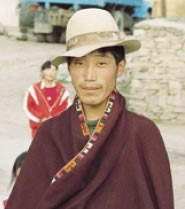Namuyi in China

Photo Source:
Copyrighted © 2026
Operation China, Asia Harvest All rights reserved. Used with permission |
Send Joshua Project a map of this people group.
|
| People Name: | Namuyi |
| Country: | China |
| 10/40 Window: | Yes |
| Population: | 8,800 |
| World Population: | 8,800 |
| Primary Language: | Namuyi |
| Primary Religion: | Buddhism |
| Christian Adherents: | 0.00 % |
| Evangelicals: | 0.00 % |
| Scripture: | Translation Needed |
| Ministry Resources: | No |
| Jesus Film: | No |
| Audio Recordings: | No |
| People Cluster: | Tibetan |
| Affinity Bloc: | Tibetan-Himalayan Peoples |
| Progress Level: |
|
Introduction / History
Areas of the western Liangshan Prefecture used to be in a province called Xikang, which was grafted into Sichuan Province in 1939. Xikang was a violent region; murder and banditry were commonplace. "Much of the banditry and lawlessness in Sikang [Xikang] can be traced to the opium trade. Confusion and violent civil strife often break out in opium-growing districts after the harvest. ... The prevalence of such lawlessness makes firearms almost a necessity, even for lawabiding citizens." For more than 200 years, up until the 1950s, the Namuyi were subject to the powerful Chrame Kingdom that was based in Muli. The king ruled with "absolute spiritual and temporal sway" over his subjects.
Although they officially belong to the Tibetan minority, the Namuyi, who call themselves Namuzi in Jiulong and Muli, speak a distinct language belonging to the Qiangic branch. The Namuyi, along with several similar groups such as the Jiarong, Ersu, Shixing, Ergong, and Minyak, have been combined into the Tibetan nationality solely on the basis of their religion.
What Are Their Lives Like?
The Namuyi practice traditional Tibetan wind burial. Corpses are cut up with an axe into small pieces and placed on a mountaintop. Ravens and other birds of prey descend and devour the flesh and organs. The Namuyi believe this enables the soul of the dead person to be scattered to the four winds.
What Are Their Beliefs?
Most Namuyi are Tibetan Buddhists, but those who live near the large and influential Nosu group have adopted their polytheistic practices.
The Namuyi have yet to hear the gospel for the first time because of their geographic, social and religious isolation. There are few Christians among any of the ethnic groups in the region. Of the hundreds of self-sacrificing missionaries who gave their lives for China, none is known to have worked in the Namuyi area. C. T. Studd, a well-known sportsman in England, gave up his fame and career to serve Christ in Africa and China. For Studd, the decision was not a difficult one to make. He simply explained, "If Jesus Christ be God and died for me, then no sacrifice can be too great for me to make for him."
What Are Their Needs?
The Namuyi people have few if any opportunities to experience the abundant life that comes from fellowship with the King of kings. Who will go to them?
Prayer Points
Pray that God will reveal himself to them and bring them to not be satisfied with spiritual counterfeits.
Pray for great breakthroughs with a rapid multiplication of disciples and house churches.
Pray for bold workers who are driven by the love of the Holy Spirit to go to them.
Pray for an unstoppable movement to Christ among them.